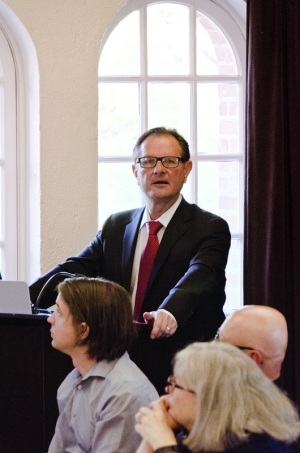Scholars Tackle Rigor in Social Work and Nursing Research
March 07, 2017 / by Eric Lindberg- Research
How can social workers, nurses and other clinicians ensure that the tools and techniques they use to treat clients are effective and not causing harm?
Leading scholars are tackling that issue in a series of conferences this year organized by the USC Suzanne Dworak-Peck School of Social Work in collaboration with other partners. Topics include synthesizing findings from previous studies, adapting interventions for new contexts and developing rigorous, evidence-based practices in social work and nursing.
“Researchers are also increasingly testing not only interventions but also implementation methods,” said Haluk Soydan, an expert in evidence-based practice and research who serves as the school’s associate dean of faculty affairs and senior fellow for global research impact. “If an intervention is not implemented in a proper way, it might fail, even if it is a strong, well-designed intervention.”
Research experts recently gathered at USC for a two-day symposium on research synthesis, an approach that involves combining and analyzing results of existing studies on a given topic to reach a stronger conclusion than possible in a standalone study.
During group discussions, presentations and informal interactions at the Lawrence and Kathleen Ell Symposium on Research Synthesis, the Science of Social Work and the Science of Nursing, leading scholars addressed issues such as enhancing current approaches to meta-analysis and systematic reviews, developing a collective approach to improving knowledge and employing research synthesis in nursing and social work.
International presence
In May, professionals, policy makers and other stakeholders interested in intervention research will meet in Stockholm for a conference on behavioral and social interventions. Organized by Soydan in collaboration with Swedish government and research officials, the gathering will explore practical, cultural, ethical and scientific factors that affect research designs.
“One of the larger issues is this idea of adaption or adoption,” Soydan said. “You have a program or intervention that works somewhere; the question is how do you ensure that same intervention works in other settings, in other cultural and social environments?”
How much can an evidence-based practice be adapted and adjusted for a new context before it is no longer effective? How can researchers evaluate new or adapted interventions to ensure they are not affected by biases that threaten to distort the validity of their results?
Addressing these vexing questions could strengthen confidence in practices used daily by clinicians in a wide array of professional settings, from social services agencies to educational institutions, the criminal justice sector and public health organizations.
In November, experts will gather for another conference in Nanjing, China, with the goal of discussing the latest approaches to research syntheses and evidence-based practice with Chinese researchers. Soydan will be joined on the trip by Marilyn Flynn, dean of the USC Suzanne Dworak-Peck School of Social Work, and fellow faculty members Iris Chi, who serves as the school’s Chinese-American Golden Age Association/Dr. Frances Wu Endowed Chair, and Lawrence Palinkas, the Albert G. and Frances Lomas Feldman Professor of Social Policy and Health.
In addition to developing new connections and potentially formal collaborations with scholars at Nanjing University of Science and Technology, Soydan said USC is also accepting two visiting faculty members and a doctoral student from the university to be trained in rigorous research methods.
“The overall goal of these gatherings is to ensure we are producing the highest-quality evidence possible to support interventions that make a difference in bettering the life conditions of individuals, families and communities,” he said.
To reference the work of our faculty online, we ask that you directly quote their work where possible and attribute it to "FACULTY NAME, a professor in the USC Suzanne Dworak-Peck School of Social Work” (LINK: https://dworakpeck.usc.edu)
